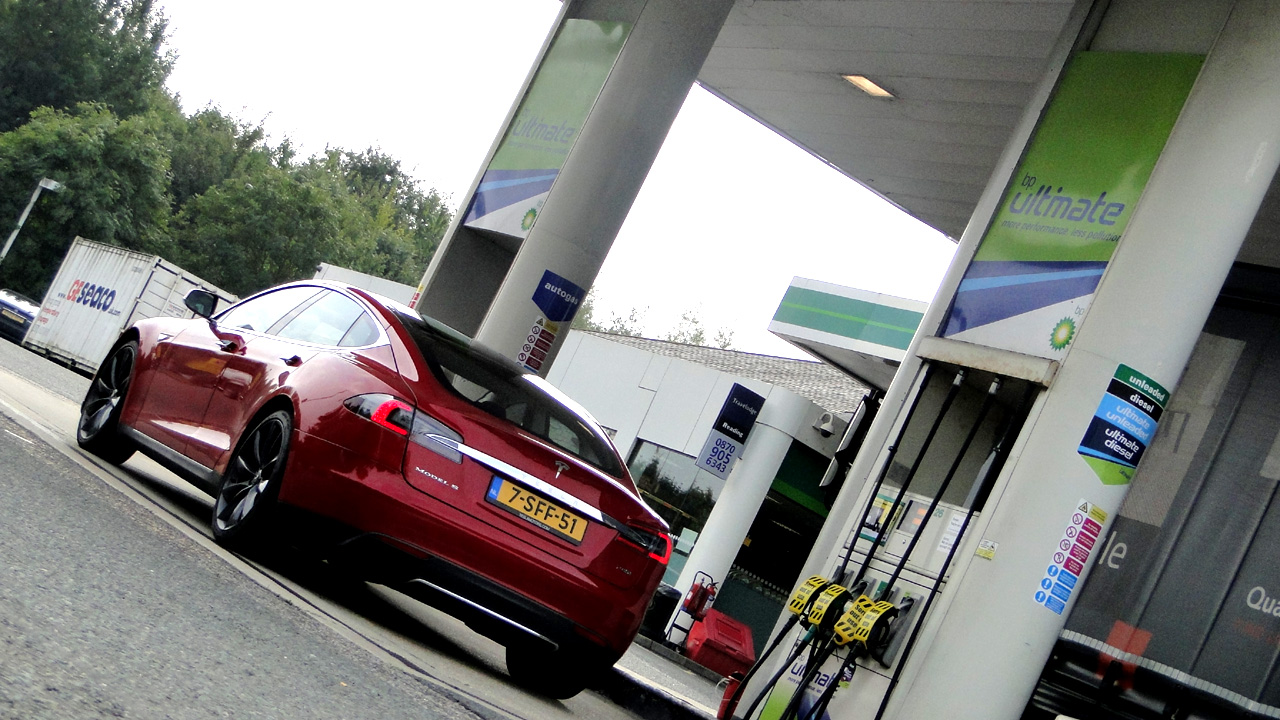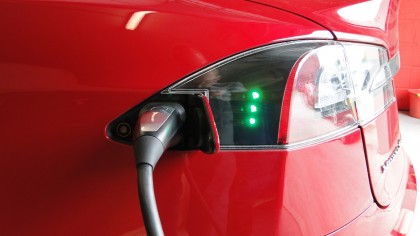Tesla plots 'electric highway' revolution for UK drivers
Land's End to John O'Groats with just one stop?

Sign up for breaking news, reviews, opinion, top tech deals, and more.
You are now subscribed
Your newsletter sign-up was successful
Maker of luxurious, high-performance electric cars Tesla plans to open a super-fast charging network that will allow its electric vehicles to drive the length of the UK with just one 20 minute break.
The news comes as Tesla's Model S saloon, which we drove back in October coming away extremely impressed, finally arrives in right hand drive format for the UK.
The most expensive version of the Models S with the largest optional battery is capable of 300 miles on a single charge.
Tesla says its fast-charging stations will add another 130 miles of range in just 20 minutes. Put the two together and you have nation-wide range.
The station network is planned to plot course from Dover and Bristol to the M25 and then up north via the M1. According to Edmund King of the AA, this could prove a 'game changer' for electric cars in the UK.
Range anxiety
After all, range anxiety has hitherto been perhaps the greatest barrier to electric car adoption. Last year, around 2,000 electric cars found homes in Blighty. That represents a pifling one per cent of the overall new car market.
So, should you dash out and buy a Model S – or even another electric car?
Sign up for breaking news, reviews, opinion, top tech deals, and more.

There are a few questions left unanswered. It's not clear when the charging network will open or its compatibility with electric cars other than Tesla's own.
Our guess on the latter is that the stations will support other brands for general charging but the fastest charging modes will be exclusive to Tesla cars, if only because the car itself need to be equipped for ultra-fast charging.
Then there's the cost of the Tesla Model S. Prices start at just under £50,000 for the cheapest Model S. To get the big-battery version, you're looking at nearer £80,000.
In that context, we can't really see the motorways filling up with Teslas any time soon. They're just too expensive. That said, Tesla is planning a more affordable £25,000 electric car for 2017, so that could change.
Alternative fuels
Anyway, the really big question is whether it even makes sense to have long-distance networks of charging points for electric cars.
There's a very strong argument that says the future of mobility involves multiple power sources, each optimised for different journey types.
Cars used for local urban and suburban runs are well suited to electric power and work well when simply charged at home over night. For really long distance driving, efficient combustion cars make the most sense.
For everything in between, plug-in hybrid or range-extended electric cars with supplementary combustion power are the best compromise. Further out, alternative fuels like hydrogen or synthetic hydrocarbons my change things up.
One of the key points here is that for most nations of earth, the power used in an electric car ultimately comes from burning fossil fuels, assuming the vehicle is charged from the main grid. And that compromises the argument for electric cars when it comes to emissions. Local emissions may be zero, which makes them great for towns and cities. But the emissions are still being generated at power plants.
Moreover, when we've spoken to leading scientists on the subject of vehicle power, they've consistently told us that batteries are simply unsuitable for long distance travel. Even with dramatic improvements in battery tech, they'll still lag far behind liquid fuels for power density.
Overall, it's a complex argument. However, one thing is clear. Even with a charging network as Tesla has described, you won't just be able to jump in a Model S and drive anywhere in the UK. It'll take a much bigger charging network to achieve that. And we're not convinced that's the best solution to future mobility in the UK.
Technology and cars. Increasingly the twain shall meet. Which is handy, because Jeremy (Twitter) is addicted to both. Long-time tech journalist, former editor of iCar magazine and incumbent car guru for T3 magazine, Jeremy reckons in-car technology is about to go thermonuclear. No, not exploding cars. That would be silly. And dangerous. But rather an explosive period of unprecedented innovation. Enjoy the ride.